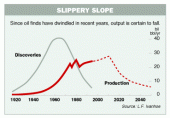What Peak Oil means for the world economy and human civilization is another question. The most dire predictions indicate that rising prices, shortages, resource wars, etc. will essentially knock us back into a pre-industrial age, with a major die-off in the human population.
The argument is that much of our way of life—transportation, agriculture, energy–is predicated on cheap oil. As oil begins to get scarce while at the same time the population is expanding and new nations are industrializing, demand will greatly outstrip supply. So much of the infrastructure of our society requires cheap energy, and as prices skyrocket, our way of life will no longer be feasible.
There are some fringe elements who push theories of “abiotic oil” or simply try to reassure us that oil is not running out. These people generally do not seem to grasp the fundamentals of peak oil and appear to be involved in denial and possibly disinformation.
It is clear that current world leaders and the media are not interested in informing people of the phenomenon of peak oil or working towards new ways of sustainability and reduced consumption.
At the same time, many speculate that current geopolitical events are being driven by this same oil crisis. The need to access and control the world’s diminishing oil resources is a compelling motivation for 9/11 and the invasions of Afganistan and Iraq.
Evidence
- Global discovery of new oil resources peaked in 1962. Today only 1 barrel of new oil is found for every 3 barrels consumed.
- The US Army Corps of Engineers reported in 2005, “Peak oil is at hand with low availability growth for the next 5 to 10 years. Once worldwide petroleum production peaks, geopolitics and market economics will result in even more significant price increases and security risks. To guess where this is all going to take us would be too speculative. Oil wars are certainly not out of the question.” 4
- “The effects of even a small drop in production can be devastating. For instance, during the 1970s oil shocks, shortfalls in production as small as 5% caused the price of oil to nearly quadruple.” 1
- Approximately 10 calories of fossil fuels are required to produce every 1 calorie of food eaten in the US. This is due to the highly industrialized agriculture process (pesticides, fertilizers, farming equipment, storage, transportation) which takes so much energy. 7
